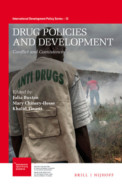Posted on 22 Jan 2021
“Decades ago, the Thai royal family effectively decided that illicit drug production was a long-term policy development issue, and that they would therefore treat it as such. They would not just go in and eradicate crops unless there were alternatives for those communities to live off, and they have seen the benefits of that policy.”
Dr John Collins, founding Executive Director of LSE’s International Drug Policy Unit (IDPU), is explaining why the Drugs and Development Hub (DDH) focuses on the work of its partner, the Mae Fah Luang Foundation, and why Thailand is often seen as a success story in development and drug policy. While northern areas of Thailand used to be a significant opium growing and trafficking region, he says, decades of government intervention has effectively shifted those communities and their economies away from a reliance on illicit crops.
“Now there are a lot of reasons why you can’t just replicate or transfer that experience to say Colombia” Dr Collins cautions. “Thailand is much smaller, the cultivation areas were much more constrained, they had support of the Royal family etc, but it is a good example of effective policy and there are of course lessons we can learn from that.”
Providing a platform
Creating the environment to enable such lessons to be learnt is one of the aims of the DDH, which launched in January 2020 at an event hosted by the Centre for the Study of Security and Drugs (CESED) at the Universidad de Los Andes in Bogota, Colombia. Led by the IDPU, in collaboration with the Global Partnership on Drug Policies and Development and the Global Initiative Against Transnational Organized Crime, the Hub provides a platform to enable policymakers and practitioners across a range of disciplines to forge connections and learn from each other.
“There is currently quite a siloed approach to international drug policy,” Dr Collins says. “You have certain actors that focus specifically on drugs, or specifically on crime or development and there’s not really a platform to enable cross-cutting discussions where these fields meet.”
Keep reading on lse.ac.uk



